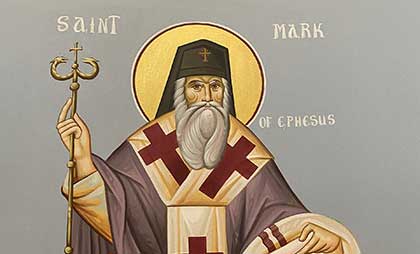
Bishop Mark of Ephesus is remembered as “a pillar of Orthodoxy” and “the conscience of Orthodoxy.” These names recall his lonely stand in behalf of the teachings of Eastern Orthodoxy at the Council of Florence (1431–1449). At the council, some high-ranking Orthodox religious and secular leaders attempted to patch up past differences with the Roman church because the eastern half of the Roman empire, hard pressed by Muslim armies, needed Roman help.
Pope Eugenius IV demanded that Eastern Orthodox patriarchs scrap key points of their theology and accept Roman Catholic dogma. Mark was the only bishop who refused to sign the one-sided agreement. To his mind, Roman Catholicism was a heretical sect. Without consultation with the East, Rome had unilaterally changed a major creed to declare that the Holy Spirit proceeds from both Father and Son. Rome also claimed the primacy of the pope over the entire church, whereas former agreements had declared the pope only “first among equals” of the five leading patriarchs. And the Western church had adopted the unscriptural notion of purgatorial fire.
Mark declared that the pope was making himself equal to God. As for Purgatory he wrote: “the notion of a punishment prior to the Last Judgment and of a purification through a material fire is altogether foreign to the tradition of the Church.”
Mark became the rallying point for Orthodox tradition. When it became apparent how influential he was among the lower clergy and people, Emperor John Paleologos imprisoned him for two years on the island of Limnos.
Feeble when released, Mark returned to Constantinople where he lived out his few remaining months. Having rejected Communion with those who were willing to adopt the Roman rites in order to obtain a false union, Mark said,
I am absolutely convinced that the farther I stand from him [the Patriarch] and those like him, the nearer I am to God and all the saints; and to the degree that I separate myself from them am I in union with the Truth and with the Holy Fathers.
Mark died on this day, 23 June 1444, after an excruciating two-week battle with intestinal disease.
Mark wrote about his ordeal at the hands of fellow Christians:
If there had been no persecution, the martyrs would not have shone, nor would the confessors have received the crown of victory from Christ and by their exploits strengthened and gladdened the Orthodox Church.
